#chapter 3 won’t make any sense without the first two chapter as context tho
Text
https://archiveofourown.org/works/29912898/chapters/97592997
Nyoom has changed Loki to Baby Loki
Baby Loki: if you do not change this ridiculous nickname immediately i will place a curse upon your bloodline, thomas
Nyoom: jokes on you my bloodline is already cursed
this is the second fic i've written and posted today. it's six pm. finals start tomorrow. here ya go
#mads ao3 fics#this is the first chapter I’ve posted to tumblr so y’all will want to read the first two#and the maybe the first work of the series but that’s up to yall#chapter 3 won’t make any sense without the first two chapter as context tho#read the notes there’s kinda MOM spoilers in it#yeah it’s a marvel fic sue me it’s a marvel fic where I fix marvel for being stupid
6 notes
·
View notes
Text
Jean d’Arc Route Summary and Translation Chp.4
Disclaimer: This is an unofficial translation based on my somewhat serviceable Japanese skills with the aid of various kanji dictionaries (and some Google Translate). As I’m doing this mostly for practice, progress will be relatively slow and there might be changes to formatting in the future. Thank you for your patience and understanding
The italicized words in brackets are the comments I made throughout my playthrough.
As promised, here’s my summary and translation of Jean D’Arc’s route in Ikemen Vampire. Obviously, there will be SPOILERS.
Before we jump right into Chp. 4, let me give little bit of context from chapter 3 since I didn't think to translate Jean's route from the very beginning:
Comte called a meeting with other vampires in the mansion to explain their entire situation to MC. So far, they've told her about their vampiric nature and their diet. Aside from Arthur, nobody else drank blood directly from humans. Even so, Napoleon told her to at least have some caution (although he can promise that nobody was going to bite her in the future).
MC asked where Jean was since he wasn't present in the dining room where they held the meeting. Mozart asked her to come along with him to Jean's quarters on the second floor (surprise, surprise, he didn't live in some ominous tower detached from the building).
Mozart point-blank confronted MC about her bite mark, which he guessed was Jean's doing. In case you haven't read up on Chp. 1 spoilers, Jean bit MC on the first night she arrived as a mansion, afterward telling her that she should've been more alert because she WAS living among stronger creatures that COULD potentially prey on her..
(Our boy sure loves to emphasize the monstrous side of vampirism and how it changed him into a predatory creature far detached from his previous human self. There's just so much to talk about here).
MC, of course, is overwhelmed by the whole situation, including Jean's reasoning for biting her. So, she asked Mozart about Jean's possible logic for doing it since they seemed to be close friends.

And that brings us to the beginning of Chapter 4.
MC, of course, was overwhelmed by the whole situation, including Jean's reasoning for biting her. So, she asked Mozart about Jean's possible logic for doing it since they seemed to be close friends.
And that brings us to the beginning of Chapter 4.
Mozart retorted, "To think that I can talk about his feelings on his behalf just because we're friends is a ridiculous assumption."
MC is taken aback by his sharp words, but admitted that he's right anyway.
He continued "In other words, go talk to him yourself and use your head."
And just like that, he opened a door and pushed MC into a room, sending her barreling on the floor. He then closed the door and called out to her from outside, basically saying. "Your misunderstanding of our relationship is wack. Come back after you talk to the guy himself."
She thought about the absurdity of the situation as the sound of Mozart's footsteps grew distant. Suddenly, a shadow fell upon her, and she followed to where it led.
In front of her was a figure gazing at her with empty eyes.
It's Jeanne. "What are you doing here?" he asked.
She stood up and apologized for suddenly barging into his room while averting her eyes from Jean's. Then she continued.
"As I'm going to burden myself upon everyone in this mansion for a month, I thought about paying my respects again." To which Jean only answered. "Is that so."
MC tried to give him an excuse as to why she wanted to go to such lengths just to greet him, which Jean didn't seem to care about. (Boy, he's rude let me tell you.) All the while, she kept thinking about how she'd soon be saying goodbye to everyone in the mansion without coming to terms with this one guy.
As MC fidgeted under his unwavering stare, she suddenly remembered her earlier talk with Mozart. She needed to confront Jean about the biting incident and understand his side of the story.
Piecing together the information she obtained from the morning meeting with everyone else, especially about their mealtimes and regarding Blanc and Rouge, she concluded that he didn't bite her out of starvation.
And she also looked back to Jean's words on that fateful night.
"If you want to return to the safety of your world, you better have a sense of danger."
"Think about how you should act to protect yourself."
(So basically Jean's telling her "If you ain't strong enough you ain't gonna last long, bitch")
But MC decided to press him more, anyway. "Why, on that night, did you bite me? Can you tell me?"
Jean answered, "If I told you the reason why what are you going to do with it?"
(Jean, that is not how you talk to ppl)
An awkward atmosphere hung between them, but Jean continued. "You weren't aware that we're vampires."
"Your wandering aimlessly around the mansion is an eyesore—"
"If you think I'm an eyesore, won't it be better if you're free of my presence?"
"Even if you said I was just an eyesore," she fired at Jean. "You didn't exactly see me as prey, do you?"
And Jean basically just answered, “Quite the carefree woman, aren’t you?”
My arms were pulled, and fingers encased in a white glove tilted up my chin.*
"Regarding that night, it doesn't matter to me however you interpret it," he murmured. "If you think of it as me being kind to you [for giving you a warning about the true nature of this mansion's residents], so be it."
"Don't approach me anymore outside of this, and get out of here this instant."
After Jean gave her the boot, MC broke down and thought about the entire confrontation, her heart racing. However, she managed to collect herself and left Jean’s door. Unbeknownst to her, Mozart had been watching the entire scene from afar. "Alas, it's no use, is it?" he sighed.

“Indeed. It is an impossible feat to unlock Monsieur Jean’s heart, especially for a newcomer like MC”
That surprised Mozart pushed MC into Monsieur Jeanne’s room.
The butler asked Mozart if he was worried about Jean. From the time they first met, Jean had been “rejecting various things, and at the same time absolutely gives up on everything.”
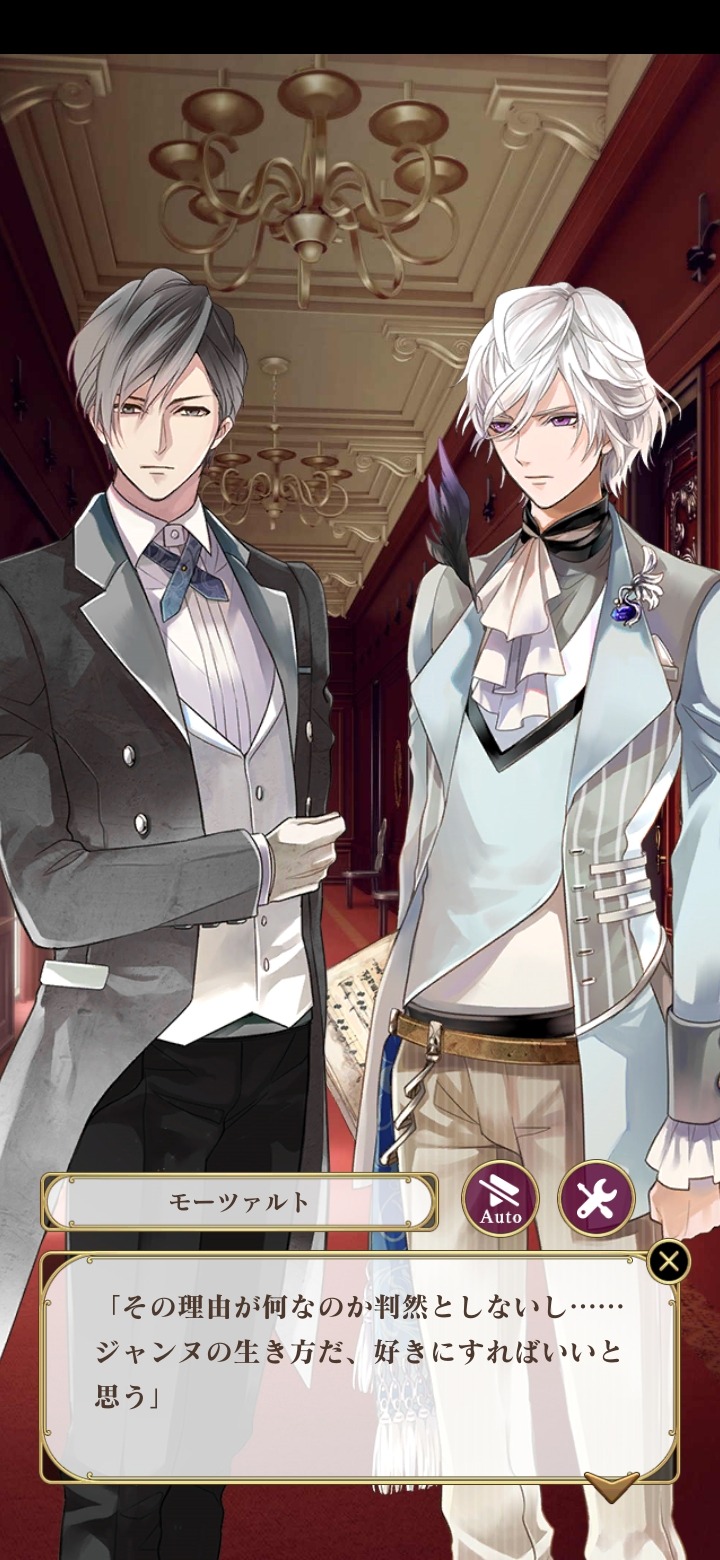
"The reason for that, I don’t know….. That's Jean's way of life. He can do as he pleases."

"But as his friend....it does concern me a little."

“A friendship between beautiful people, how precious!”
(That’s not what you should be focusing on, you idiot).
“Herr Mozart, if you give up, then that’s when everything is truly over.” Sebastian beamed. “Please leave it to me as this mansion’s butler, for I have something in mind.”
Mozart shrugged his shoulders as he gazed at the eccentric butler’s smile.

(This part is more dialogue and screenshot-heavy as I want to avoid misinterpretation as much as possible)
A quiet night descends upon a moonlit church at the foot of a forest, far away from the mansion. Inside, a lone man walks under the moonlight, reflected on the stained glass patterns. He narrowed his orbs*, whose left and right colors are different.
“Master, do forgive me for not paying my respects as of late.” He greeted another man.
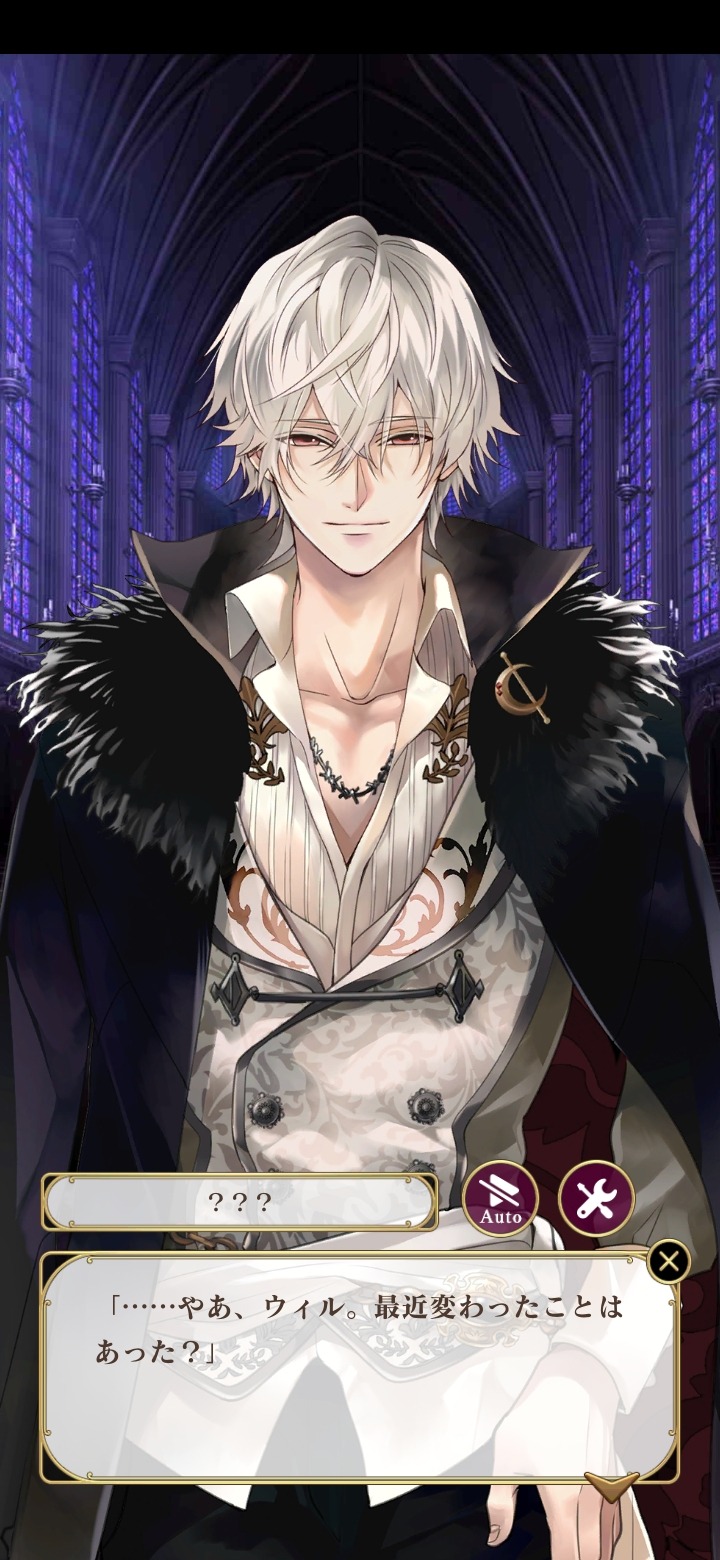
“Ah, Will. Have there been any changes lately?”
Will proceeded to tell ??? about a young woman stumbling through the door from another world and into the mansion. He also notified Vlad that the Comte has allowed her to impose on them for a month.
The white-haired man smiled amusedly. “Ah, the most intriguing things do occur, don’t they?”
“But what I can’t comprehend,” Shakespeare frowned. “This woman is seemingly an ordinary human of no virtue.”
“As if an impurity has mixed in with the brilliance of the great men.”
Shakespeare hoped that she wouldn’t be a hindrance to his plans, and I quote: “A creature that only invites tragedies instead of comedies. And I have no use of such mediocre tragedies.”
After some exchange, ??? said, “A creature that only invites tragedies instead of comedies. And I have no use of such mediocre tragedies.”
"Indeed," Shakespeare concurred. "I strive for the finest tragedy with the most exquisite cast."
"The great men who are set to dance on the stage you've set up," His master smirked. "They make the finest marionettes, don't they?"
"That is why, Master, I've decided to join hands with you."

"With you, who carries the same power as the Count....."

"What is it you desire, Will?"

"Can you lend me your power and arrange for a livelier cast?"
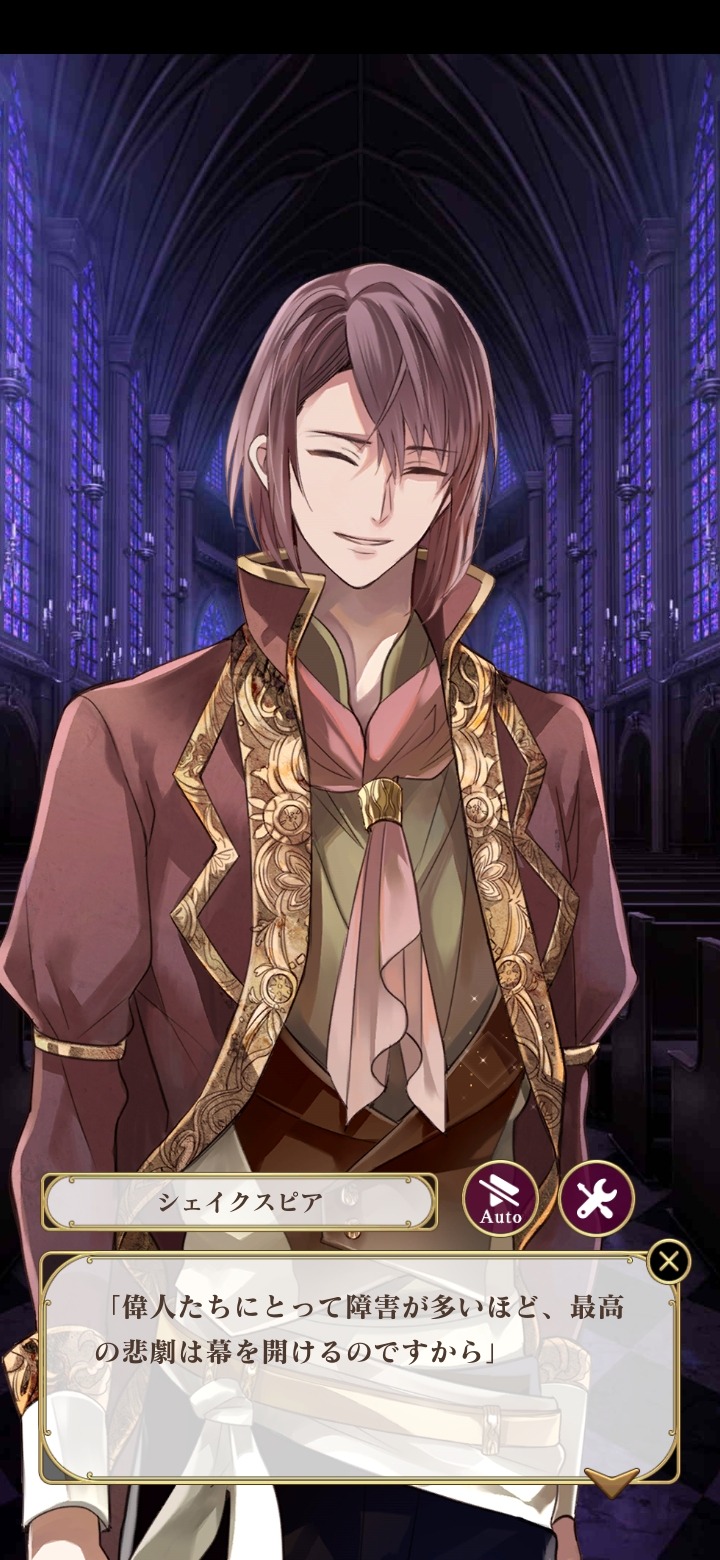
"The greater the obstacle they face, the more exceptional the tragedy that ensues."
"I'll think about it," his master replied.
Smiling elegantly, the red-eyed man looked up at the moon. Behind his eyes shone a glint of a power that can move the entire world.
(In KennieJD’s words: “You both deserve each other cause y’all crazy as hell”).

*1: I nearly fell off my chair translating this part
*2: The original kanji says “双降”, which doesn’t come up if you search on any kanji dictionary. I asked Asha about this, and she said it’s a typo on Cybird’s part. It’s supposed to be 双眸, which means ‘a pair of eyes’
I didn't intend this to be this lengthy and dialogue-focused, but I realized that I really enjoy writing lines for bitchy characters. Jean and Vlad's were especially a delight to work with! I couldn’t do much for Shakespeare’s lines tho. I haven't been an English Literature student for two years.
Tagging @hokkaido-fox for now. Let me know if you want to be tagged in upcoming summaries and mini-translations!
Credits to @ashavazesa for her tremendous help with some of the kanji.
#ikemen vampire#ikevam jean#ikevam jeanne d'arc#ikevam jean route#rikevam spoilers#riri tries translating
60 notes
·
View notes
Text
Masquerade Kiss: Do Bad Girls Like to Self-pleasure? Kazuomi Shido - otona love - chapter 2 summary/translation
sorry this is coming out a little later than i anticipated. i bought and read the entire story in advance to get a sense of the length but my strategy backfired and now after reading it, i find translating more tiring since i already know what happens lol. but there were requests for me to keep translating so naturally i had to do it. once again, i’ve placed a cut because this translation is long and image-heavy, so make sure to click the “keep reading” to see the full chapter.
you can read the previous chapter here, where kazuomi accidentally sees you doing ~something~ to yourself under the sheets...
you’ve told him to take a shower and you’re moving under the bedsheets.
feelings that he can’t remember [feeling before] well up in kazuomi at the sight of what looks like you pleasuring yourself.

“...was there a problem with how we make love?”
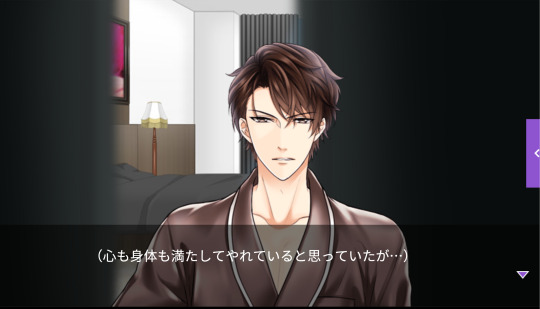
“i thought i satisfied both your body and soul...”
however, looking at it now, it seems like that’s not the case. perhaps you’re taking care of yourself because you’re unfulfilled or dissatisfied with his actions.
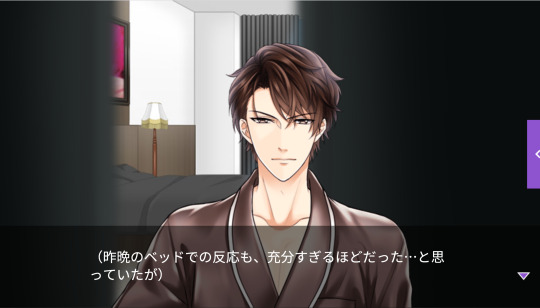
“i thought your reaction in bed last night was more than sufficient”
he thinks maybe he should have been more relaxed/taken things easier, and not just in bed. maybe he should have listened to you vent out all your work stress?

“sensitivity comes from daily heart-to-hearts...”
basically he’s saying that the connection between you two is strengthened through daily everyday communication ughaskjlsd kazuomi is so sensitive and romantic i can’t deal.
“certainly, i’ve been so busy these days that we haven’t had time to meet,” he thinks, but didn’t realise that it would have such have such a direct effect. this kind of thing has never happened to him before, so he’s unusually confused.

“is my love not being conveyed enough...?”
to calm himself down, he quietly closes the door so you won’t notice him.
you tell him you need to leave early this morning. taking your turn after him, you’ve had a quick shower and got ready in no time.
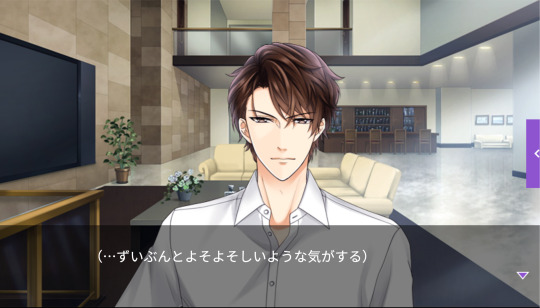
“...the mood is pretty awkward”
he wonders if you noticed what he saw, or maybe you’re just embarrassed after doing ‘that activity”.
you’re about to leave, but he says
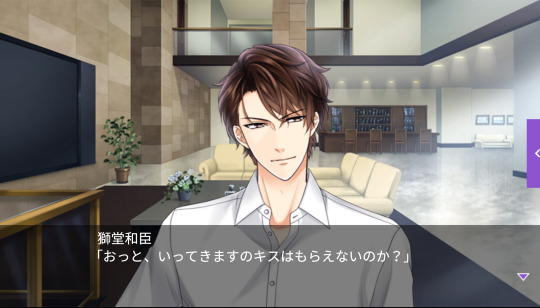
“whoa, can’t i get a goodbye kiss?”
(there’s that cheeky おっと again)
“ah... yes...” you say, and stretch up, holding onto his shoulder to get closer to him. you usually kiss him for longer, but today it’s just a quick one. you tell him you’ll contact him again. he takes a sip of his completely cold coffee, thinking back on what you did yesterday.
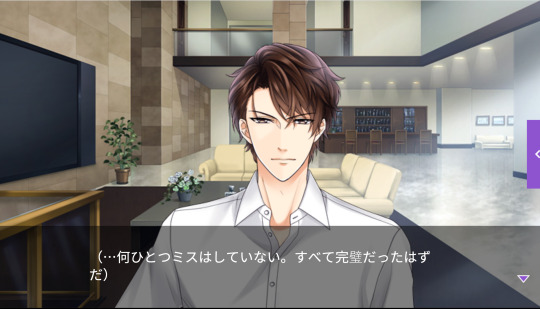

“...i didn’t make any mistakes. everything should have been perfect”
“and yet, she still wasn’t satisfied...”
he had completely no idea. frowning over his cold coffee, he gets up.
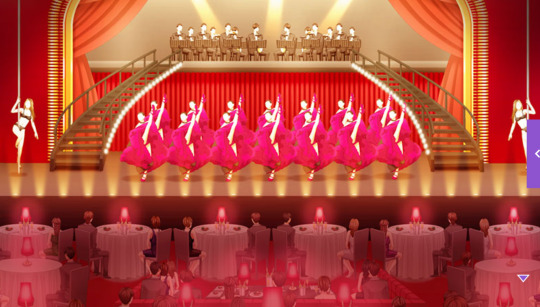
anyway we’re at the club now and i’m just laughing at the background because this is the first time i’ve seen it so large (since i’m reading on my laptop) and look at how many couples are inexplicably here together? also that random couple on the second table which is mirrored in the next one lmao. and having pole dancers and cancan dancers next to each other with the musicians at the top of the stage... what kind of club do the three musketeers run...

“that night, i was at the usual place with yuzu and kei.”
he’s eating the food that’s being brought in, but the sights that he saw the other day won’t leave his head. (i’m a bit confused by the wording of this because didn’t it happen just this morning?)
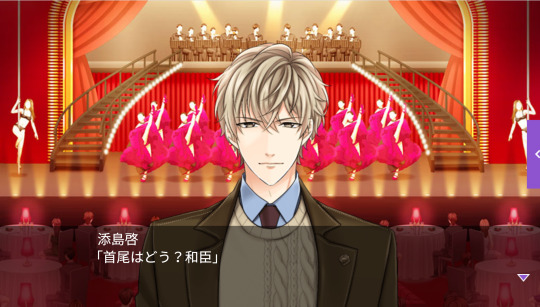
kei: “how are things? kazuomi”
kazu: ahh... well...
they were making plans for a “secret room” for the new resort he’s developing. it’s progressing without any problems, but honestly that’s not the issue right now.
kei: ...kazuomi?
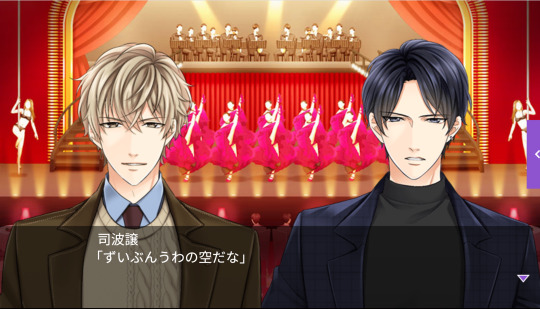
yuzuru: “you’re very absent minded”
kazuomi thinks that you’re feeling lonely* because you haven’t seen each other for a while. he wonders if you’ve been self-pleasuring in that way in the meantime.
*honestly i can’t tell whether or not he think you’re feeling lonely or if he’s feeling lonely bc there are no possessive pronouns lol.
so in the meantime [that you’re apart] he might have become not enough. in that case, the issue after all is the time when you can’t meet. (basically that the issue is that you don’t get to spend enough time together).
he thinks about that melty face you get in bed.
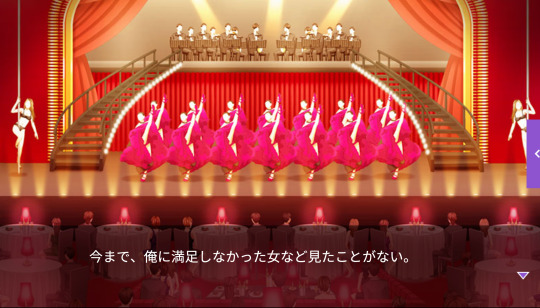
“up until now, there hasn’t been a woman i haven’t satisfied.”
the confusion he felt this morning gradually disappeared, and now he’s filled with the feeling of being faced with a new challenge. “if that’s the case, how do i satisfy her?” he wonders. he declares (in his head) that he’ll satisfy you to the point where you can’t live without him.

kei: “hm? are you planning something fun again?”
kazu: does it seem like that?
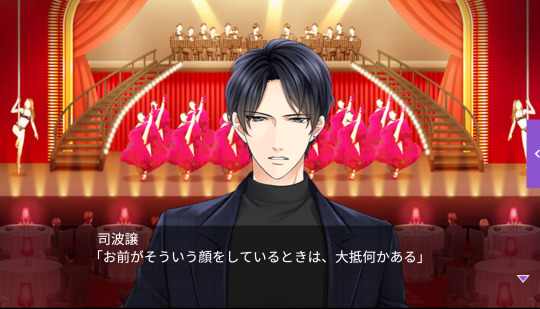
yuzuru: “when you have that look on your face, you usually are”
kazu thinks that it seems that it did show on his face.
yuzu: so, what is it that you’re going to do?
kazu: nah, it’s not a big deal
kei: you’re grinning while saying “it’s not a big deal”? you’re not fooling anyone

“talking to you guys is annoying”
(bruh lmao)
kei: hmm, now i definitely want to hear
yuzu: usually you cause trouble by yourself, but i like to be entertained too occasionally
kazu: don’t i always entertain you?
kei: well, it’s as yuzu says, the one who causes the most trouble is kazuomi
kazu: you guys never change (? not sure if i translated that right)
he thinks something about the fact that they’re poking fun at him.
kazu: actually, this time...
when he tells them what he saw, kei’s eyes widen slightly.

kei: “hmm. so mc-san** masturbates even when kazuomi’s there”
**i finally changed my name to my usual キラ but he’s basically saying your name there so i’ll use mc to refer to “your name”
yuzu: is that why you were so absent minded?
kazu: even up until now, i’ve never experienced this kind of trial the day after embracing someone

“there are countless women who have pleasured themselves during the times when we can’t meet”
(lmao!!!)
kei: well i’ll neither agree nor disagree with that... so, what conclusion have to come to as to why mc-san did “that”?
(i’m actually not 100% on what he said but i think that’s what he means through context)
kazu: i’m stumped because i have no idea
kazu: well, strongly speaking(?), i’ve been so busy lately that i couldn’t look after her***
***he means this in the emotional sense, like he hasn’t had time to worry about her concerns/really care for her
kei: but you met her in person and satisfied/appeased her, didn’t you?
kazu: that was my intent
yuzu: in other words, she wasn’t as satisfied as you thought
(bro why you gotta be so blunt lol)
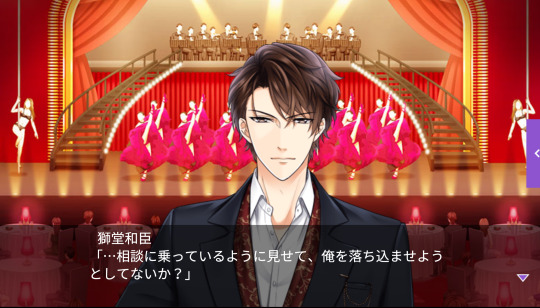
“...are you trying to make me depressed by treating me like i’m seeing you for a consultation?”
yuzu: i didn’t say anything about getting a consultation
kazuomi unintentionally smiles wryly while taking a sip of champagne.
kazu: anyway, that’s the main reason ... have i not said enough? (i think basically he’s wondering if he and his mc haven’t been talking enough)
kei: to mc-san? i think you’ve said plenty. when mc-san came to masquerade just recently, you were murmuring so affectionately it was annoying.
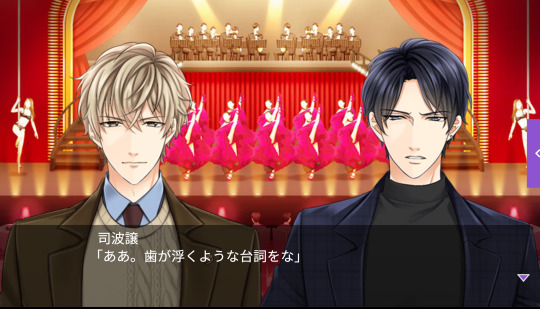
yuzu: “yeah. the things you said were nauseating”****
****set his teeth on edge - literally make his teeth float
kazu: what words...? i don’t understand what you mean since i normally say them unconsciously
(lmao!! kazuomi is a natural cheeseball)
kei: in kazuomi’s case, i urge women to breathe (no idea what this means: kei says “息するように女性を口説くからね” if anyone can help)
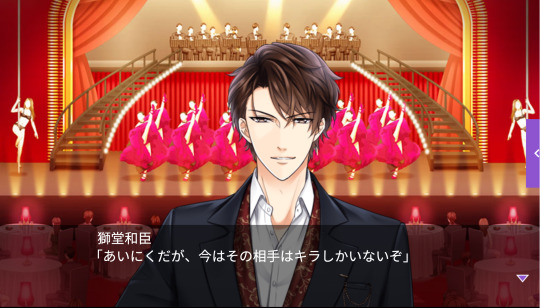
“sorry but my only partner is mc now”

yuzu: “do you want a consultation? [or] do you [just] want to brag?”*****
*****惚気: speaking fondly of a love one, praising/bragging about one’s spouse
after all that, the cause of mc’s “~activity~” was still unknown.
--
aaand that’s the end of chapter 2! i really like the direction this story is going in. i think a lot of people’s fantasies are that he would find it really hot but honestly kazuomi just wants to fully monopolise and satisfy his lover. tbh i’d be hella insecure if i had sex with my bf and then he went to go jack off again after lol. it was really cute seeing slightly insecure kazuomi but of course i love seeing him bounce back and treat it as a challenge, as he always does with everything in life, but especially with his mc. it was really fun getting to see some quality banter between the three “S”es, although it was a nightmare to translate some of it... i did learn some new slang tho.
i hope you enjoyed this chapter! please let me know what you think is going to happen. if you want to read more of my translations from voltage’s otona love, you can read my completed translation of soma’s super steamy “not the story of your first night” (chapter one here) or check out my translations page.
i’ve set up a ko-fi page here and would be incredibly grateful if you would like to support me for translations and being able to purchase more routes to recap in english!
click here for chapter 3
#kazuomi shido#voltage smut#otona love#otkoi#summary#translation#voltage#voltage inc#voltage otome#otome game#otome blog#otome romance#love 365#love 365 find your story#マスカレード・キス〜危険な駆け引き〜#獅堂和臣
41 notes
·
View notes
Text
How Prologues Actually Function & 6 Types to Consider

In a lot of ways, I'm an atypical person, but one of the ways I'm atypical is that I actually love prologues, and always have. As a teenager, I would be excited when I opened a book that said "Prologue"--years later I'd learn over and over again that a lot of people in the writing industry actually hate prologues! And the first few times I heard that, I was baffled.
I think some of the hate stems from not understanding how they actually function or when to best use them--two things I'm going to cover today.
First, let's talk about some of the reasons why people have said not to use prologues.
1. Some readers (can't remember the exact stats, but I think it might have been half) skip prologues anyway.
2. Story openings are very difficult to write, and by having a prologue, you are having to essentially write two openings--why would you do that to yourself? And you have to win the audience over--twice!
3. Prologues often contain unnecessary information, so you can just discard them. Start with the beginning of the story--chapter one!
I don't know about you, but all of these explanations left me wanting. And none of them felt like good enough reasons to ax prologues altogether (especially the second--if you want to be a writer, you probably won't make it far if you are scared of difficulty). Furthermore, a couple of years ago I perused bookshelves at a bookstore and found loads of novels that opened with prologues. Huh? Haven't I been advised not to do that?
You mean I don't actually have to hate prologues as much as I've been told?
Let's dig into them.
The Most Important Function of a Prologue
You can look all over online about when and why you should or should not use a prologue, and I'll touch on some of that in the types. But in my opinion at its bare bones--when you strip away all the differences between prologues out there--prologues are about making promises of one kind or another to the audience. That is the main function of a prologue.
Like all writing rules, there may be some exceptions to that once in a while, but I'd argue almost always prologues = promises.
Some might say that prologues only relate to giving out information that the audience can't get otherwise. I think it's fair to use them that way, but not all good prologues actually function that way, and even those that do still simultaneously makes promises. The promise comes from giving that information.
Prologues are also often displaced from the rest of the novel in some way--so one might argue that's what makes a prologue. But when I look at prologues, that doesn't quite hold up either. The only function that seems to, is promises.
Now, there are a lot of different promises you can make.
- You can make an emotional promise by communicating to the audience what kind of emotions this story is going to appeal to.
- You can make a promise about what kind of plot this story is going to have. Does the prologue cover an old unsolved murder case that's gone cold? The reader will assume the plot is going to involve that.
- You can make thematic promises about the theme topic or what sort of takeaway value this story might have.
- You can make promises about a type of character.
- About a relationship.
- About worldbuilding, setting, or a time period.
- Or about any kind of draws that your audience picked up your book or genre for in the first place.
- And you can make promises by foreshadowing
But most of the time, the most important function of a prologue is that it makes promises. For some, that might come strictly by providing information. But if you provide information with no sense of promise, it's probably a lousy prologue.
Some of you might be wondering if the first chapter of the story makes promises anyway, why do you need a prologue?
It's true that many, if not most, stories don't need a prologue at all. There are enough clear promises in the first chapter, and enough information in the actual novel, and adding a prologue would make the story weaker.
But for the stories that would benefit, there are a few different kinds of prologues with different functions that you might want to consider when you are wondering about packaging those additional promises (or critiquing someone else's).
Types of Prologues
Theatrical
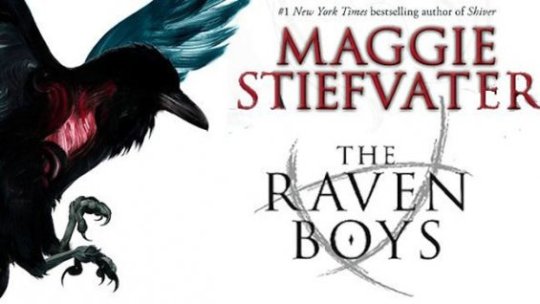
I've talked in a previous post that in the film industry, there are two types of movie trailers: the theatrical trailer and the teaser trailer. (And what do trailers do? They make promises to audiences about what kind of movie this is going to be.)
A theatrical trailer is longer than a teaser trailer. It conveys the basic plot of the story. It communicates what the story is about. It gives us the setup. Here is an example of a theatrical trailer. (Notice how the setup is clear and chronological.)
Books are obviously a different format, but you can have a theatrical prologue in the same way.
The prologue promises what the plot is going to be about and clues us into the setup.
It simply introduces an overall plot of the story or series that may not be the main focus in the beginning chapters of the book itself--so it's a prologue.
The Raven Boys by Maggie Stiefvater is a good example of this, and you can read it here.
This is the opening line to give you a good idea:
Blue Sargent had forgotten how many times she'd been told she'd kill her true love.
The prologue goes on to introduce us to the sorts of magic the book includes (psychics and fortune-telling, for example). It introduces us to the setting. It establishes a particular lifestyle, or what's "normal" and ends on something (or someone) that changes that normal.
But the prologue continues to come back to the same topic: If Blue kisses her true love, he will die.
This gives us a sense of what this book series will probably be about. But since this is the first book, it's not going to be the sole focus, so the prologue is a good place for the introduction.
Teaser

In film, teaser trailers are different than theatrical trailers. While theatrical trailers make promises to the audience by conveying the setup and introducing the plot, teaser trailers make promises to the audiences by focusing largely on raw emotional appeals.
Here is an example of a teaser trailer.
Notice how unlike the theatrical trailer, we don't really get a clear setup or plot. Sure, we see and hear snippets of it, but the trailer functions off making promises to the audience about what kinds of emotions they'll experience if they watch this movie.
Teasers lack context--that's one reason why they are so short (and why they are teasers). You can't hold an audience long if you don't give them enough context. But the audience knows that if they go to the movie, they will get the context and plot.
Some prologues are teasers. They promise a certain experience and also promise that if the audience reads the story, they will understand (aka, get the context) the event. I did a whole post on teasers here, so I'm not going to repeat everything.
I know a lot of people don't like Twilight, but I'm actually fine with the series. And I'm aware that technically the opening is a "Preface," but I'm going to grab it because it's an example of opening with a teaser nonetheless:
I'd never given much thought to how I would die — though I'd had reason enough in the last few months — but even if I had, I would not have imagined it like this.
I stared without breathing across the long room, into the dark eyes of the hunter, and he looked pleasantly back at me.
Surely it was a good way to die, in the place of someone else, someone I loved. Noble, even. That ought to count for something.
I knew that if I'd never gone to Forks, I wouldn't be facing death now. But, terrified as I was, I couldn't bring myself to regret the decision. When life offers you a dream so far beyond any of your expectations, it's not reasonable to grieve when it comes to an end.
The hunter smiled in a friendly way as he sauntered forward to kill me.
Notice we don't get a lot of context. We don't know exactly what's happening or how the character got here. But the passage makes emotional (maybe even thematic) promises to the audience of what will be included in the story.
Stephenie Meyer's The Host does open with a prologue that is teaserly as well. And so does I am Number Four. We lack a lot of context when we start reading, but it will become clearer as we get into the actual novel.
Dual Draws
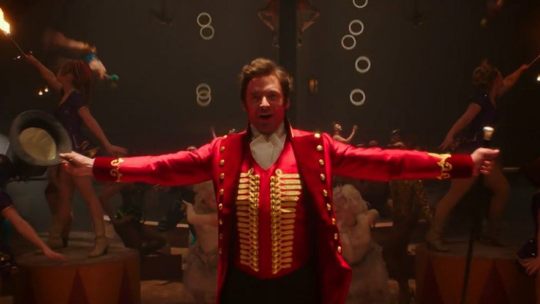
Some opening chapters have quite different draws (or promises) than later chapters. A prologue might be a good way to bridge that and help balance the appeals for the audience.
The Greatest Showman is a perfect example of this.
The story really starts with Barnum being a child. He doesn't even come up with the circus until maybe a third into the movie. Filmmakers understand, though, that one of the film's major appeals is the circus. So what did they do?
They essentially opened with a "prologue"--promising the audience a set of draws that can't fit into the actual beginning--because Barnum hasn't made the circus yet.
It's arguably one of the best film openings today.
Here is the opening.
And here is the actual "first chapter."
This is a case in particular where having two "openings" really is a strength. By having dual openings, you can showcase the story's draws on opposite sides of the spectrum. So, within the first 15 minutes of The Greatest Showman you get a taste of the spectacle and the fantastical of the circus as well as the personal and intimate conflicts and relationships that Barnum has.
Use this prologue when some of the powerful appeals don't appear until later in the story, so that you can promise them to the audience right out of the gate.
Christopher Paolini's Eragon might be a a good example of this. In the prologue, we get a sense of battle and other creatures and magic and even dragons, but the protagonist himself doesn't really encounter those things until later in the story. The prologue promises that those things will come.
Alternative Viewpoint

For some stories, the audience would benefit from information or a perspective that the main viewpoint character or characters can't give. Sometimes prologues are in a different viewpoint to give the audience access to that information.
The City of Ember is an example of this.
The characters don't really have access to what the builders of the city knew. So the prologue is used to convey that to the audience.
When the city of Ember was just built and not yet inhabited, the Chief Builder and the Assistant Builder, both of them weary, sat down to speak of the future.
"They must not leave the city for at least two hundred years," said the Chief Builder. "Or perhaps two hundred and twenty."
"Is that long enough?" asked his Assistant.
"It should be. We can't know for sure."
"And when the time comes," said the Assistant, "how will they know what to do?"
"We'll provide them with instructions, of course," the Chief Builder replied.
"But who will keep the instructions? Who can we trust to keep them safe and secret all that time?"
"The mayor of the city will keep the instructions," said the Chief Builder. "We'll put them in a box with a timed lock, set to open on the proper date."
In any case, promises come through the information and context given to the audience (that the main characters don't have and therefore can't give.)
Sometimes the prologue may be different in how viewpoint is actually handled. It might be in second person when the story is in third. In third person with the novel is in first. But the decision should have a point and not be random.
Time Displacement
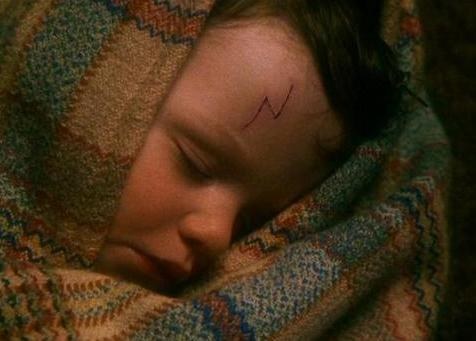
Use a prologue when you need to include scenes (in order to provide context and promises and/or foreshadowing or information) that take place during a different time than the rest of the novel--when it's out of sequence with the rest of the story. Usually this means that the prologue takes place in the past, but it can also mean future. It may or may not have the same viewpoint character.
Some of you might laugh, but the first chapter of Harry Potter is a good example of this. I'm aware that it's called a first chapter, but go read it again, and you'll realize it's really a prologue in disguise (maybe the people behind it didn't like prologues and thought it would be clever to call it chapter one). The entire chapter takes place about a decade before the rest of the story (also in other viewpoints), when Harry is a baby. It's out of sync with the rest of the novel and we don't meet Harry until the end. It also contains elements of the other prologue types I've outlined here. In fact, like many prologues, you could essentially skip the first chapter of Harry Potter--though that gives you an entirely different opening context since you don't have that information or those promises. (Sort of like starting The Greatest Showman with Barnum as a child.)
Informational
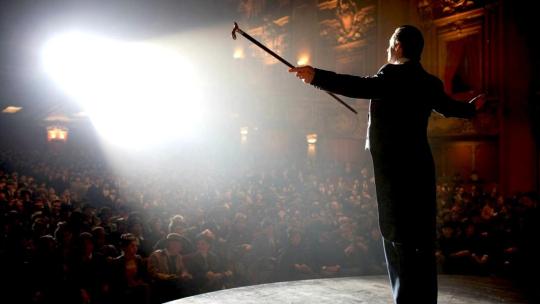
Like some of the others, this one can blend in and overlap with the different types, but just to help us with discernment, and because I have a few things to say about it, I'm making it its own category.
Some people say that a prologue is only good if it contains essential information--but that simply is not the case. You could cut off a lot of teaser prologues, dual draw prologues, and even others and still follow the story. (Besides, if half of readers skip a prologue, then you sometimes have to weave that information in another way anyway.) Like I said, you could cut off the first chapter of Harry Potter and you'll essentially get all the information you missed in other parts of the story. This is why I argue that it's promises, not information, that is the driving force of prologues. You can cut off the opening of The Greatest Showman and you would miss out on zero information (what you miss out on is the promises).
But some prologues are strictly there to provide information to the audience, and in some rare cases a prologue might be the only way to deliver that (skip at your own risk). In order to be good though, that information is going to provide promises too (and not read like an info-dump).
Star Wars movies essentially start with an informational prologue--but remember, books and movies are different, and if you write a prologue like Star Wars does at the front of your story it will not be acceptable by today's standards. Lord of the Rings (both book and movie) has an informational prologue--which once again would actually not be acceptable to write in today's day and age in front of a novel. Why? Because it will come across as an info-dump and probably read kind of boring. (Does anyone actually remember the real book prologue to Lord of the Rings? It's basically a long author note about Hobbits.) The Fellowship's prologue on Hobbits worked in Tolkien's time, but it wouldn't get published today. (Because of film and technology, audiences today don't need that much help and guidance to imagine and understand something that doesn't exist in the real world.)
This is one way that I see prologues go wrong. The prologue should almost never read like an info-dump. Instead, think of the information you need to convey and see if you can convey it in a nice scene. An actual scene, with a character and event.
The City of Ember example doubles as an informational prologue. It's telling the audience the beginnings of the city. Notice that it has the audience focus on actual characters having a conversation, and isn't just a big long paragraph of the narrator giving out information.
Sometimes the information itself isn't essential, but is instead significant in some way. The other night I watched The Prestige (cause you know I love Christopher Nolan's writing and seeing Hugh Jackman performing spectacle shows in the 19th century). The opening works as a prologue, but the information isn't necessarily vital to understanding the story. Instead, it's important because it introduces a theme weaved into the movie. With the prologue the audience can watch the film with the idea that the knowledge will be significant in some way. (Notice how the film example doubles as a teaser.)
Here is the opening.
More Types
I'm sure there are more types you could categorize, and I'll have to keep my eyes out for them. And as I said above, many prologues fit into more than one type. But I still think it's helpful to have the categories, because it helps us understand them.

People often don't understand that because a prologue works differently than the rest of the novel--that's why it's a prologue and not just lumped in with everything else--it can't usually be criticized like the rest of the novel.
And because people don't understand the true core of their function (promises), prologues can draw a lot of (inaccurate) criticism from critique groups and others.
I've been to a number of writing conferences where editors have said they always skip the prologue in a submission. I used to think it was because they didn't like prologues--hated them even. Now that I'm an editor, I find myself doing the same thing--and I like prologues. It's not because it's bad. It's because it functions differently. And I'm geared up to be critical of the first chapter. So often I'll skip or just scan the prologue and come back later to take a closer look--a clearer look--when I have a better idea of how that prologue should be functioning in relation to the rest of the work (and the promises it should be making). For example, if the prologue is a teaser, I'll read through it, but often wait until I get more context to come back and edit it. But whatever the case, you should always be looking at the promises it's making.
#writing#writer#writing tip#writing tips#writing tips and tricks#author#editor#writing help#writing helps#writing lesson#writing lessons#writing advice#writing reference#writing a book#fanfic#fanfiction#writeblr#writblr#writerblr
120 notes
·
View notes